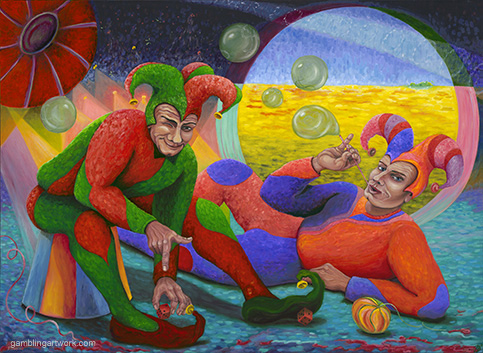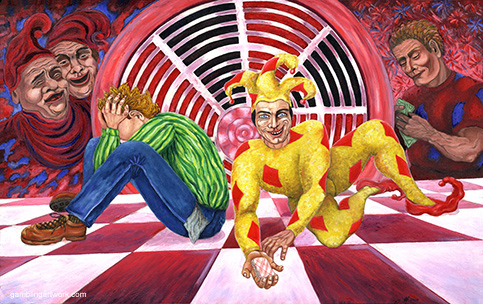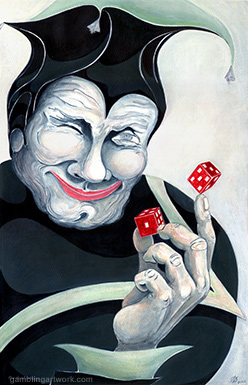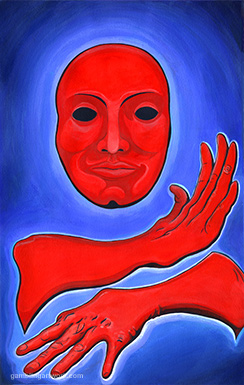"I can resist anything except temptation." -- Oscar Wilde
"Temptation is the desire to fall, to fail, to faint and to squander all one's reserves until there is no firm ground beneath
one's feet." -- Georges Bataille
"Leonardo da Vinci said: when a man with a joyous thrill is waiting for a new day, new spring, new year, he doesn’t suspect that, in this case, in essence, he desires his own death. Though, this aphorism of Leonardo da Vinci in its form of expression is not grotesque, the spirit of carnival lies at its base." -- Mikhail Bakhtin
"The collusion of children with clowns is a collusion with art, which adults drive out of them .... If games of chance are the opposite of art, as forms of play they nevertheless extend into art." -- Theodor W. Adorno
About Gambling Artwork
as a sign of greatness, is an essential prerequisite.
-Friedrich Nietzsche
Ecce homo: how one becomes what one is.
Two Russian novels "The Gambler", by Fyodor Dostoevsky, and "The Queen of Spades", by Alexander Pushkin, prompted my interest in the games of chance before writing my thesis “Organization of Casino Activity as a Modern Recreation Center under Conditions of a Large City.” I conducted my research in the newly opened casinos and nightclubs in St. Petersburg, Russia in the 1990's. I researched gaming not only as entertainment. I was interested in historical, managerial, economic, and psychological aspects. Besides interviewing casino management, event producers, psychiatrists, and visitors, I spent a lot of time researching the historical and cultural aspects of gambling.
Some Historic Facts
Card games came to Russia from Germany at the beginning of 17th century and spread widely. However, playing high stakes games was not new to Russia. For example, in 1584, Ivan the Terrible, being near death, played chess with Boris Godunov betting the entire content of the regal treasury.
By the end of the 19th Century, card games became an important recreation of the Russian high society. Knowing how to play certain card games became an important part in social education of young men and women. Every respectable house was expected to have rooms for gaming, even books on social etiquette included chapters on how to behave during card games.
This is how the famous lover Casanova described the atmosphere of a game in one of the St. Petersburg houses: "Everything was in French manner: food and drinks were fabulous, lively conversation, and the game was even better. High Society in attendance consisted of honest people who would lose without regret and win without boasting."
In 1766 Katherine The Great created a gaming law. According to this law all card debts should be forbidden and that a son financially dependent on his father shouldn't be trusted. This law affected the mentality of Russian players for centuries. Society reacted to this law by creating a "code of honor" that prescribed gamblers to pay card debts on time. By the end of the 19th century society people were joking that many people knew rules, laws, and etiquette related to card games better than civil law. Gamblers religiously followed the "code of honor" rules because to break them often meant to loose integrity.
Gamblers can be very irrational in pursuit of the winnings. They often look for "signs" which may bring them luck in gambling. Searching historical archives I came across an 18th century story told by a gambler:
One night, while walking to my social club to play cards, a bird pooped on my shoulder and ruined my coat. I arrived at the club very upset by this event. However, I joined the game and won big that night. Now, every time, when I am on my way to the club to play cards, I walk through this same alley waiting for a bird to fly over my shoulder and repeat the incident. I am convinced that the bird brought me luck.
Influenced by the desire for risk–taking and adventure a gambler is not after a monetary reward. Experienced as a confrontation with fate, a game of chance brings enjoyment through its instantaneous ups and downs. During a game a player may experience an emotional phenomenon called ardor and fall into the hands of uncontrolled emotions. When making a bet, a person might feel as if on the "edge" and the passing of time may be experienced in slow motion where a single moment lasts and lasts... . A person not predisposed to enjoying such an emotional 'ride' of a game might play just once or twice in their lifetime.
People in my work are not costumed performers -- they embody human desires and motivations. Paintings 1998-2003.




